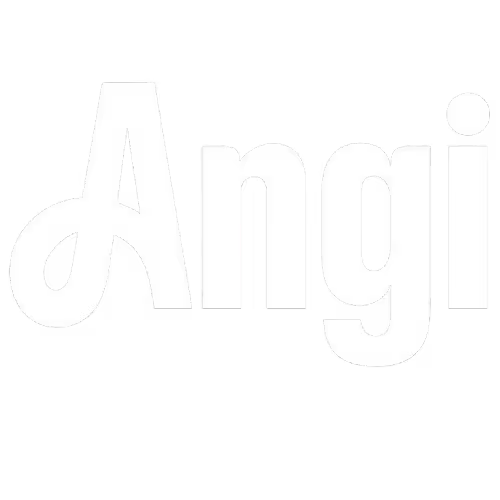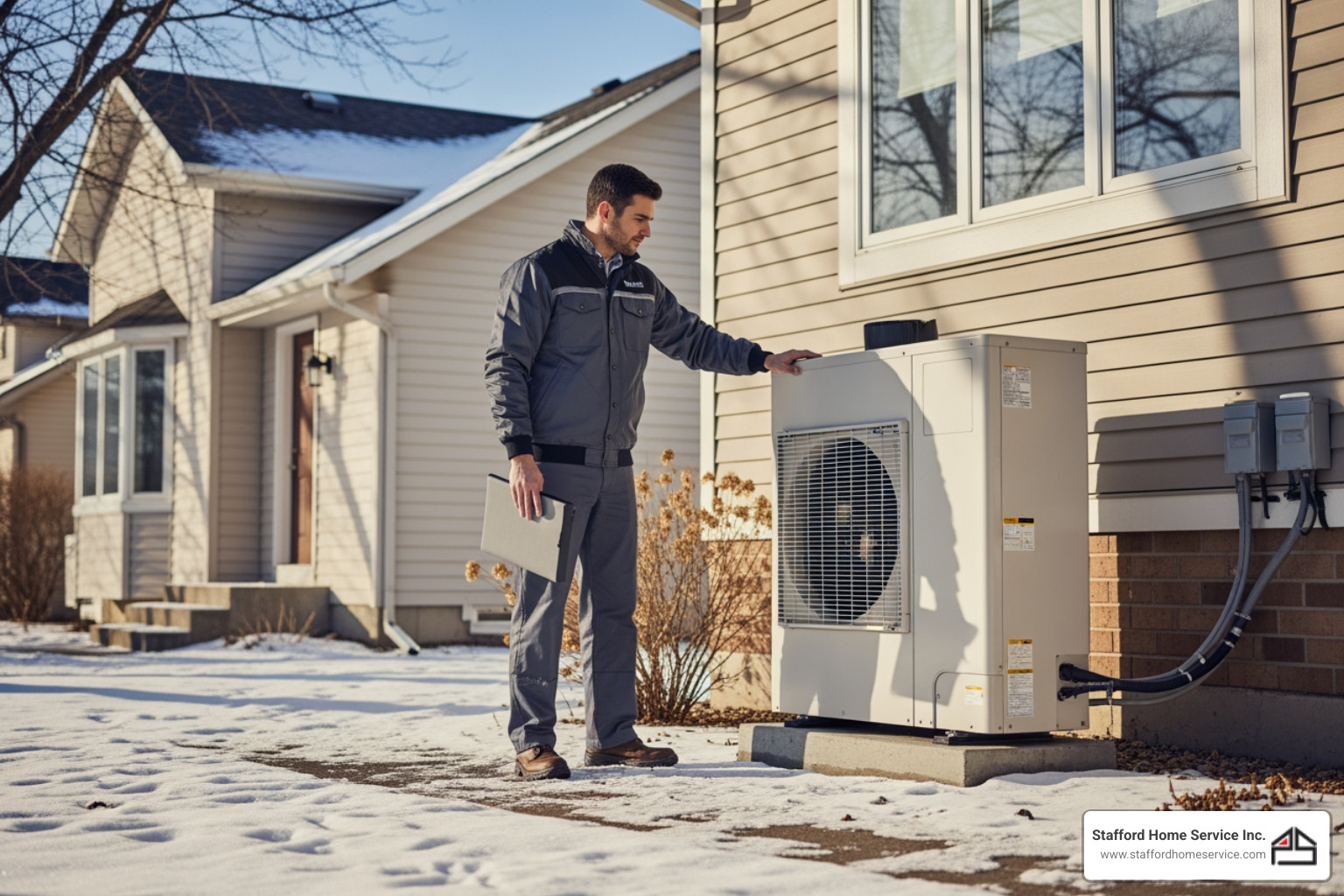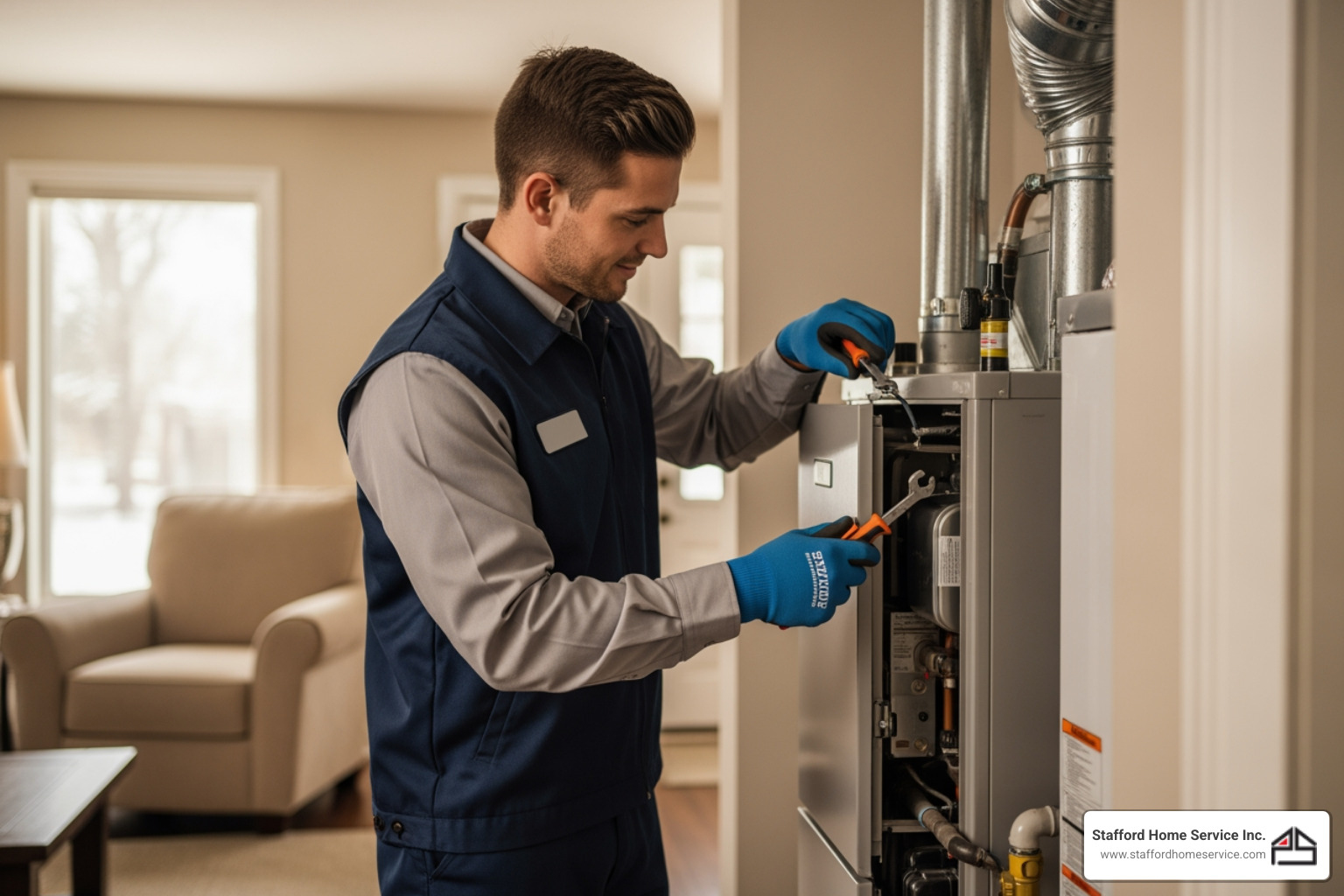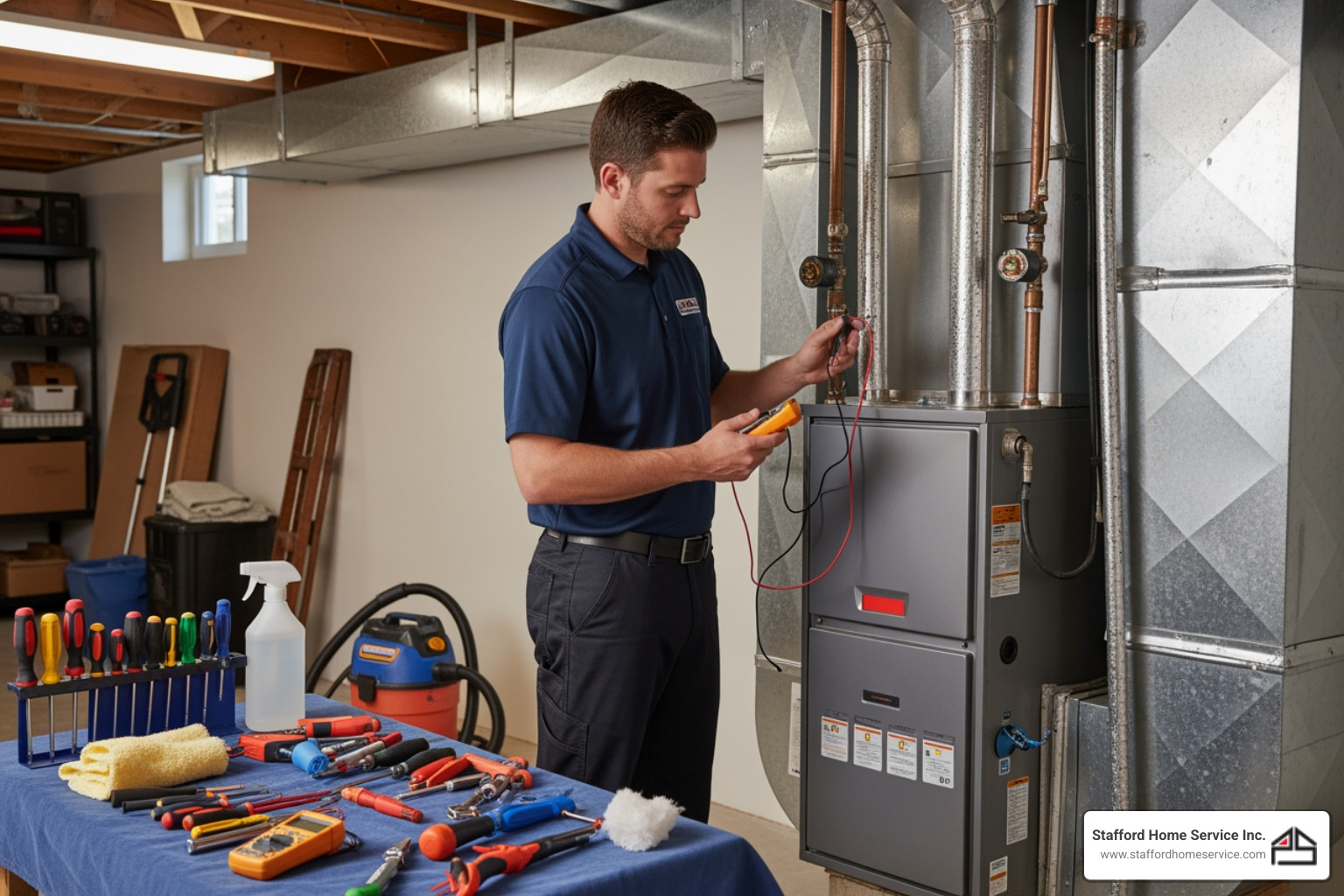EV Charger Installation: What You Need to Know
Unlock convenient home charging with expert EV charger installation. Learn types, costs, and ensure a full battery every day.
Why Home EV Charging is the Smart Choice
A home EV charger installation is the key to open uping the full potential of electric vehicle ownership. With over 80% of EV drivers charging at home, a dedicated station transforms your daily routine and eliminates range anxiety.
Quick Guide to EV Charger Installation:
- Level 1 (120V): Uses a standard outlet, adding 3-5 miles of range per hour.
- Level 2 (240V): Requires professional installation, adding 25-30 miles of range per hour.
- Installation Cost: Typically $1,000-$3,000 for equipment and labor.
- Key Requirement: A 240V circuit and sufficient electrical panel capacity.
- Permits Needed: Yes, handled by a licensed electrician.
- Timeline: Usually completed in 4-6 hours by professionals.
Electric vehicles are increasingly popular in Minnesota, offering savings on fuel, a lower environmental impact, and a quiet ride. The real game-changer is the ability to wake up every morning with a fully charged vehicle.
Home charging is essential for most EV owners. Public stations can be unreliable or crowded, but a home charger gives you control, letting you take advantage of lower overnight electricity rates. This guide covers everything from charger types to the installation process, helping you make a safe and efficient choice for years to come.
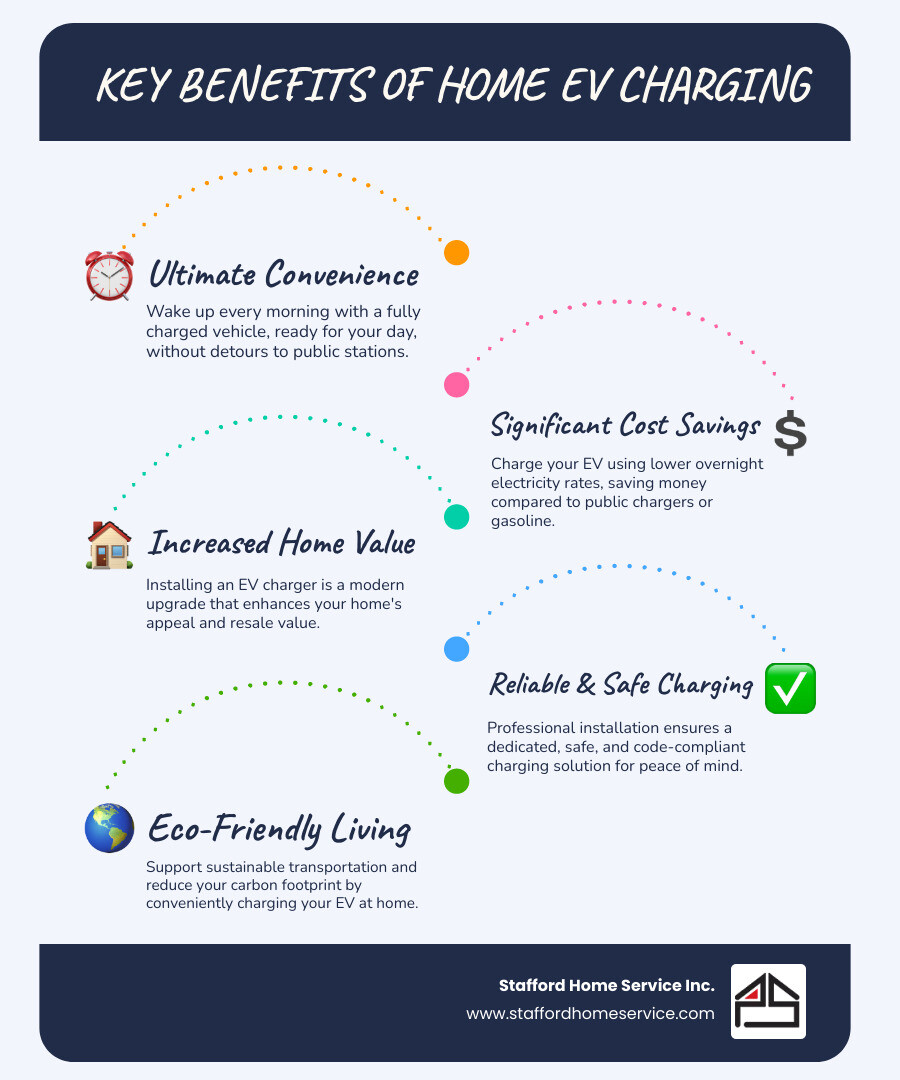
Understanding EV Charger Levels and Types
Choosing the right charger is straightforward once you understand the basics. The equipment you install at home, known as Electric Vehicle Supply Equipment (EVSE), connects your car to your home’s electrical system. Different types charge at different speeds.
Level 1 charging uses a standard 120V wall outlet. While it requires no special installation, it’s very slow, adding only a few miles of range per hour. A full charge can take 10 to 20 hours, making it suitable mainly for plug-in hybrids or low-mileage drivers.
Level 2 charging is the ideal solution for most homeowners. Using a 240V circuit, it allows most EV owners to get a full charge overnight. This is the most convenient and popular option for all-electric vehicles.
Level 3 DC Fast Charging is the commercial-grade option found at public stations. It can add significant range in 20-30 minutes but requires industrial-level power unavailable in residential settings.
For installation, you can choose between plug-in chargers, which connect to a 240V outlet for flexibility, and hardwired chargers, which connect directly to your electrical panel. Hardwired units are more stable and can often deliver more power.
Smart chargers connect to your Wi-Fi, offering features that can save you money and provide peace of mind. The key is matching your charger to your driving habits. For more on why EVs are a great choice, see our guide on the Benefits of Buying an Electric Vehicle.
What Are the Benefits of a Level 2 Charger?
Most EV owners find Level 2 charging essential for daily convenience.
- Faster Charging: A Level 2 charger ensures your car is fully charged overnight, ready for your day. This eliminates range anxiety and the need to plan charging stops.
- Added Home Value: A professionally installed Level 2 charger is an attractive feature for potential home buyers, showing your home is modern and future-ready.
- Overnight Convenience: Simply plug in when you get home and wake up to a full battery. This convenience is a major reason why about 60% of drivers who start with Level 1 eventually upgrade, according to industry data. You can more about the benefits of upgrading.
Smart Chargers vs. Standard Chargers
Smart chargers offer practical, money-saving benefits over standard models.
- Remote Monitoring: Check your charging status and get notifications on your phone, so you always know if your car is plugged in and charging.
- Charge Scheduling: This feature automatically starts charging when electricity rates are lowest, often overnight. Taking advantage of Time-of-Use (TOU) rates can significantly cut your charging costs.
- Energy Tracking: Monitor exactly how much energy your EV uses, giving you clear data on your “fuel” expenses.
These features provide control and can lead to substantial savings. To see if TOU rates are available for you, learn about Time of Use rates.
Key Factors Influencing EV Charger Installation Costs
Several key factors influence the cost of an EV charger installation. The total investment includes the equipment, professional labor, and any required permits. Every home is unique, so costs vary based on your electrical system, charger location, and potential upgrades.

Your Home’s Electrical System
Your home’s electrical system must be able to support the new charger. Most Level 2 chargers require a dedicated 240-volt circuit. Homes with modern 200-amp electrical service are often well-equipped, but older homes may need an upgrade.
Beyond total capacity, your electrical panel must have a free slot for a new circuit breaker. The wiring type in your home (copper vs. aluminum) can also affect the installation. An electrician will assess your system to determine if a panel upgrade is necessary to safely support the charger. For more details, you can find more info about electrical panel upgrades.
Installation Location and Complexity
The charger’s location significantly impacts project complexity. The distance from the electrical panel to the charger is a primary cost driver, as longer distances require more wiring and labor.
Indoor installations in a garage are typically the most straightforward. Outdoor installations offer more flexibility but require weatherproof units and potentially trenching for underground wiring, which adds to the scope and cost. We use durable, weatherproof chargers designed to withstand Minnesota’s climate.
Stafford Home Service Inc. handles all these complexities. Learn more about our Electric Vehicle Charging Station services and how we ensure a smooth process.
Permits and Government Incentives
Permits are required for an EV charger installation to ensure the work is safe and meets local codes. Skipping this step can cause issues with insurance or home sales. As licensed electricians, we handle the entire permitting process for you, ensuring compliance with Minnesota’s local electrical codes.
To help offset the cost, government incentives are often available. The Federal Alternative Fuel Infrastructure Tax Credit can cover a portion of your installation costs, and Minnesota may offer state-level rebates. Be sure to check for current programs.
These incentives can significantly reduce your overall investment, making it an excellent time to install a home charger.
The Professional EV Charger Installation Process
An EV charger installation is not a DIY project. It involves working with 240-volt circuits, which requires professional expertise to ensure safety, code compliance, and peace of mind. Proper installation by a licensed electrician protects your home, your vehicle, and your family.

Step 1: Home Assessment and Quote
The process begins with a thorough home assessment. A licensed electrician evaluates your entire electrical system to ensure it can safely handle the new load. For an accurate quote, we’ll need photos of your electrical panel, the proposed installation location, and the make and model of your EV.
We help you choose the right charger for your driving habits and vehicle, ensuring it has a UL listing for safety. Attempting a DIY installation is risky and can lead to electrical hazards or voided insurance. Learn more about our professional EV Charger Installation services for a seamless process.
Step 2: Permitting and Preparation
A key benefit of professional service is that we handle all permitting paperwork. We are familiar with the local electrical codes in Minneapolis, St Louis Park, and throughout the Twin Cities, ensuring your installation is fully compliant.
Once permits are secured, we schedule the installation at your convenience. Most jobs take 4-6 hours. Before we arrive, we ask that you prepare the workspace by clearing the area around your electrical panel and the charger location. This helps us work safely and efficiently.
Step 3: What to Expect During Your EV Charger Installation
On installation day, our licensed electricians will:
- Run a dedicated 240-volt circuit from your panel to the charger location, designed to handle the sustained load of EV charging.
- Ensure proper wiring and grounding using high-quality, code-compliant materials for a safe, long-lasting installation.
- Securely mount the charger unit on a wall or pedestal for stability and easy access.
- Conduct system testing and verification, checking voltage, amperage, and all safety features to confirm everything works correctly.
- Provide homeowner education, walking you through how to use your new charger and answering any questions.
You’ll be left with a professionally installed, code-compliant charging station ready to power your vehicle.
Frequently Asked Questions about Home Charging
Here are answers to the most common questions homeowners have about EV charging.
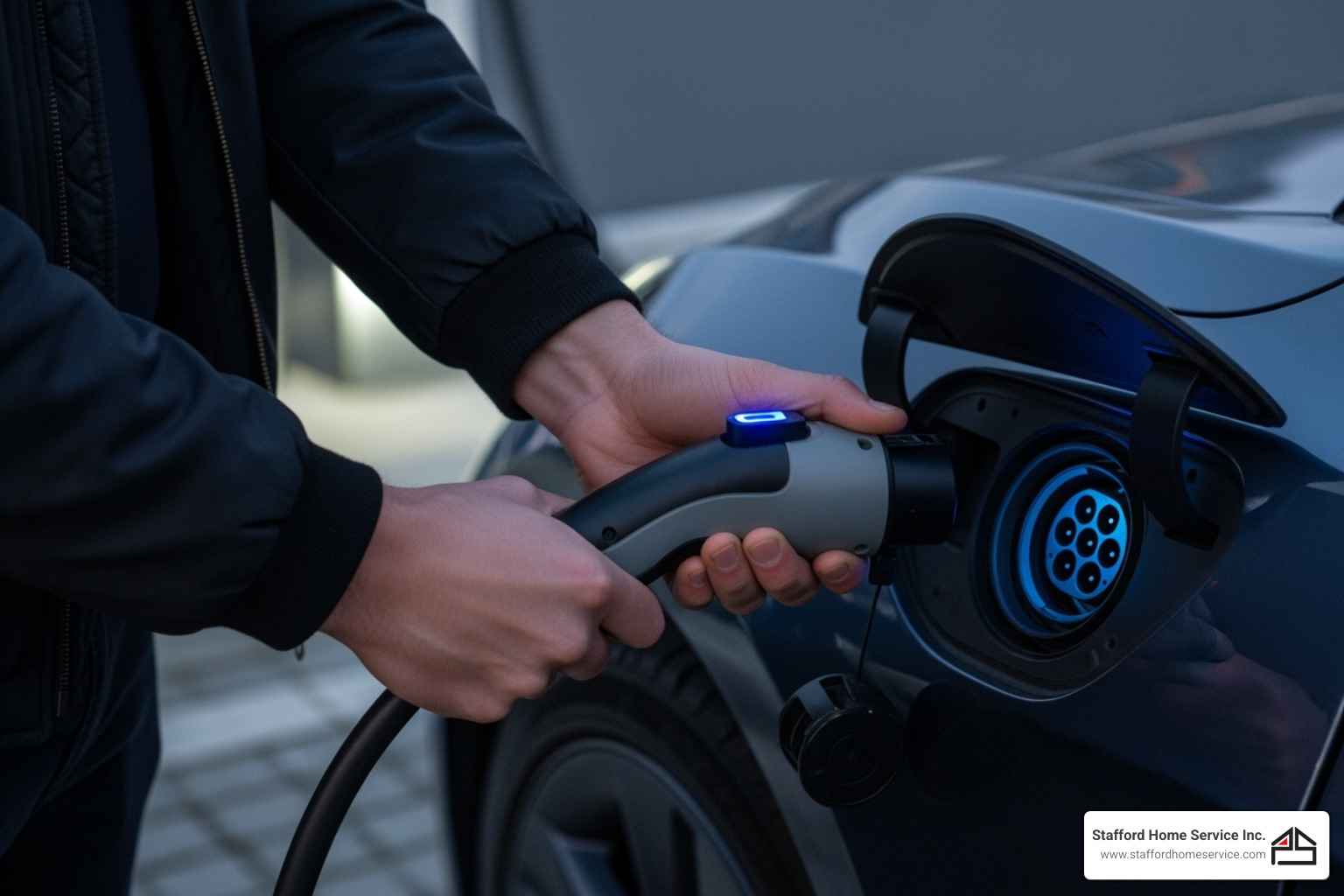
Do I need to upgrade my electrical panel for an EV charger?
Not always, but it’s a critical part of the assessment. Your home’s electrical panel must have enough capacity to handle the added load from an EV charger.
Most homes with 200-amp service have sufficient capacity. However, an upgrade may be necessary if your home has an older 100-amp or 60-amp panel, if there are no available breaker slots, or if your current system is already near its limit. In some cases, a sub-panel can be installed as a more affordable alternative to a full panel replacement. Our electricians will recommend the safest, most cost-effective solution for your home.
What’s the difference between a hardwired and a plug-in charger?
This choice depends on your priorities for power and flexibility.
- Hardwired chargers are permanently connected to your electrical system. They are very stable, offer a clean look, and can often deliver higher amperage (up to 80 amps) for faster charging speeds.
- Plug-in chargers connect to a dedicated 240V outlet (like a NEMA 14-50). Their main advantage is portability; you can potentially take the charger with you if you move.
The installation cost for a new plug-in outlet is often comparable to a hardwired installation, so the decision typically comes down to prioritizing maximum charging speed (hardwired) or flexibility (plug-in).
How long does a Level 2 charger take to fully charge an EV?
With a Level 2 charger, most EVs can fully charge in 4 to 8 hours, making overnight charging easy. However, the exact time depends on several factors:
- Vehicle Battery Size: Larger batteries (like in an electric truck) take longer to charge than smaller ones (like in a compact sedan).
- Charger Amperage: A 48-amp charger adds range faster than a 32-amp charger.
- Vehicle’s Acceptance Rate: Your car has a maximum charging speed it can accept, which may be lower than the charger’s output.
Temperature can also affect charging speed, especially in cold Minnesota winters. Despite these variables, a properly installed Level 2 charger provides more than enough speed for daily use, ensuring you start every day with a full battery.
Power Your Drive with Confidence
Reliable home charging is what makes owning an electric vehicle truly effortless. While a standard outlet is an option, Level 2 charging has become the gold standard for its speed and convenience, allowing you to wake up to a full battery every day.
Professional installation is essential for a safe and code-compliant EV charger installation. This is a complex electrical job that requires a licensed expert to protect your home and vehicle. The investment is well worth the peace of mind and the daily convenience of never having to search for a public charging station again.
At Stafford Home Service Inc., we bring our commitment to quality workmanship and customer satisfaction to every EV charger project. We serve homeowners across Minneapolis, Edina, Golden Valley, Minnetonka, Plymouth, St Louis Park, and greater Minnesota. Our experienced electricians guide you through every step, from the initial assessment to the final walkthrough.
Ready to make home charging a reality? Schedule your professional electrical service today and let our team help you power your drive with confidence.
Customer Testimonials
Our customers consistently praise our knowledgeable technicians, prompt service, and the lasting quality of the work we deliver.





